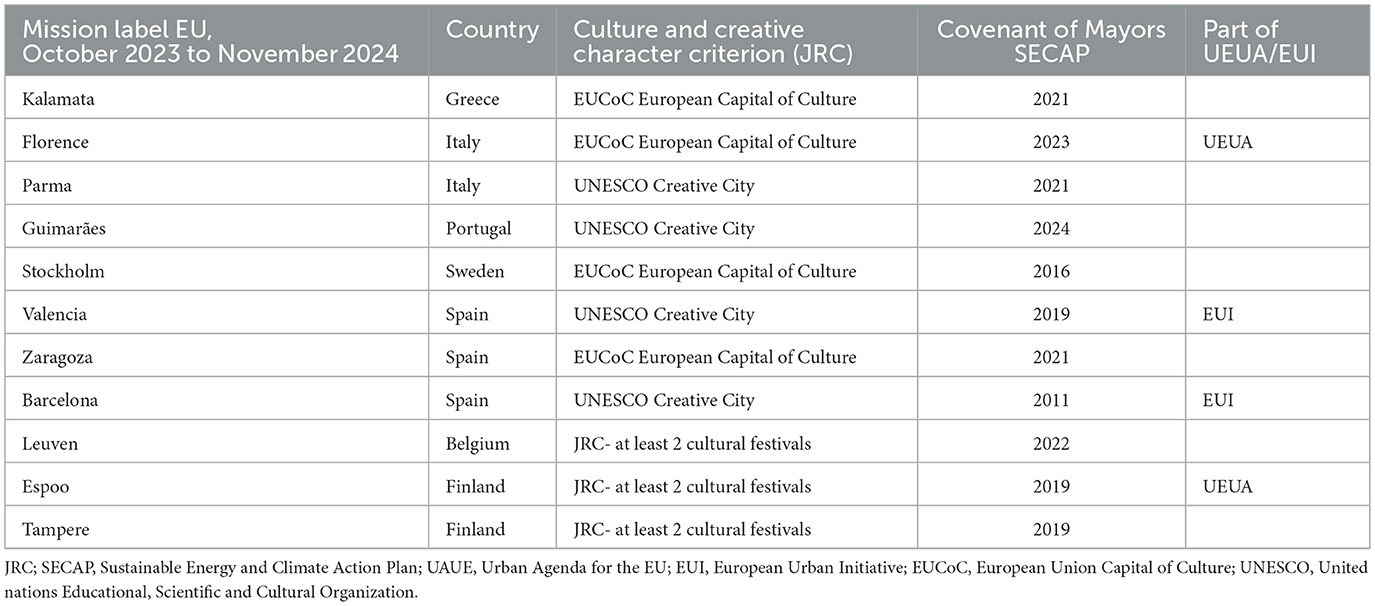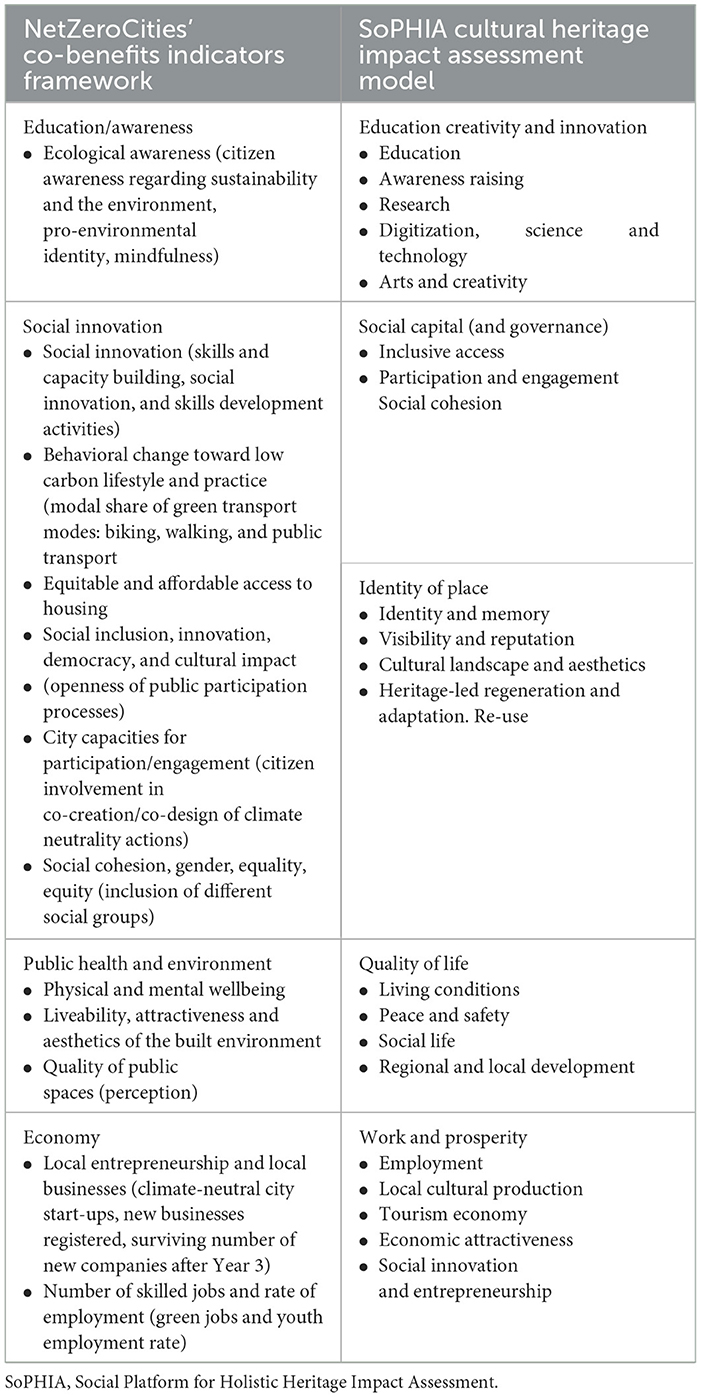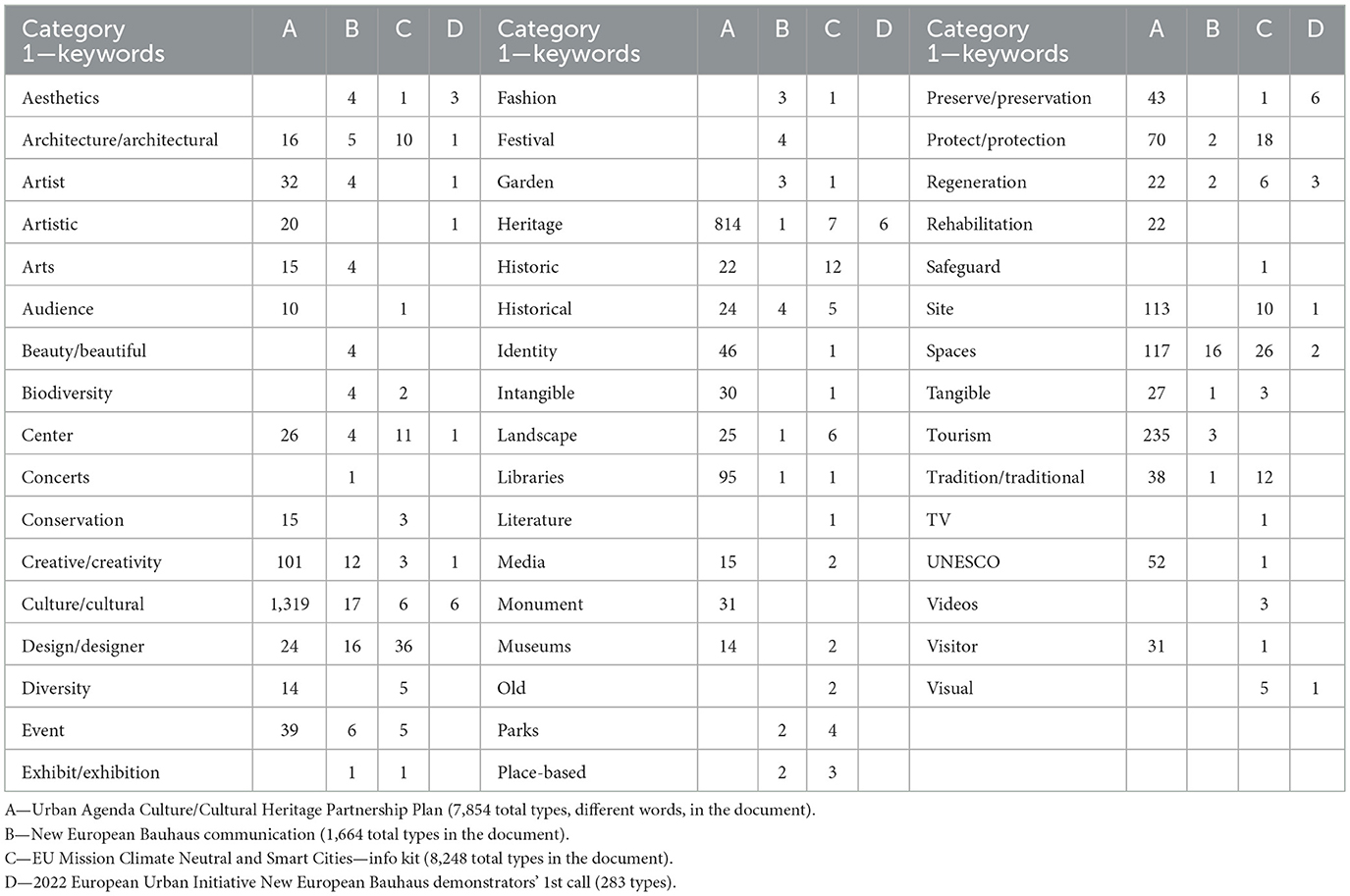- Department of Energy Technologies and Renewable Sources, Italian National Agency for New Technologies, Energy and Sustainable Economic Development (ENEA), Rome, Italy
Cities are at the forefront in linking their socio-economic development to culture and heritage that they are slowly acknowledging as a way to also address climate change. Cultural participation can influence a diverse range of social impact areas, such as health and wellbeing, social cohesion and intercultural dialogue, innovation, and education, as well as community-driven urban and territorial renewal and development. The sense of heritage ownership is a complex relationship between individual, collective, and institutional claims that can leverage action and better governance. With the New European Bauhaus (NEB) initiative launched in 2021, the European Union pledges culture's contribution to the European Green Deal and advocates the role of cultural institutions, as they play a vital role in strengthening community engagement. This article illustrates to what extent culture (arts, heritage, cultural, and creative industries) and NEB principles are mainstreamed into recent and innovative urban energy and climate policies to drive behavioral change and improve networking and multi-stakeholder commitment. We have focused on a sample of the 100 EU Mission Cities. By analyzing their road maps for climate-neutrality and smartness, the Climate City Contracts (CCCs), we have addressed the following questions: – Do cities rely on culture and heritage for a just transition? – What is the role of arts, heritage, cultural, and creative Industries in their pathways for a just transition? – Do these actions take advantage of digitalization? Based on the vocabulary categorization, we have started developing a text mining method that may support extending the analysis of “culture for climate action”—related elements to a broader number and types of urban transition policies. We have interpreted the CCCs sample providing a high-quality human-annotated corpus. The aim is to train a future artificial intelligence model that could help assess impacts and identify other culture and heritage-based experiences to enhance “Knowledge for Policy” toward the NEB application in cities.
Introduction
Culture is defined as the set of distinctive, spiritual, material, and affective features that characterize a society or social group, concerning ways of life, fundamental human rights, values, beliefs and traditions [United Nations Educational, Scientific and Cultural Organization (UNESCO), 2023].1,2 Urban cultural life creates relationships between people and values. It is considered a suitable terrain to influence, inspire, and guide civil commitment toward sustainability and climate.
Some forms of cultural participation have shown to drive climate-related behavior change3 on mobility choices (Quaglione et al., 2019), energy demand, and collective initiatives (Shortall et al., 2022). A few exemplary cities are already harnessing the power of culture to create growth, regenerate neighborhoods, strengthen social cohesion, and inspire transformational change (Julie's Bicycle and C40, 2017).
With the Paris Agreement, the role of culture in the Action for Climate Empowerment has been advocated and recognized from international organizations, governments and networks such as UNESCO (2019), the Organization for Economic Co-operation and Development (OECD), the International Council on Monuments and Sites (ICOMOS),4 and the United Nations Framework Convention on Climate Change (UNFCCC).5 During the UN Climate Change Conference 28 in Dubai - United Arab Emirates (UN COP28), in response to the Climate Heritage Network (CHN) Call6 signed by the main international cultural and cities networks and associations, governments have been asked to expedite integrating culture, values, and diverse knowledge systems into their climate action and mainstreaming climate action across cultural agendas. According to the OECD (2022), cultural participation can interact and reinforce other forms of civic engagement, such as political participation, volunteering, and community engagement. A first analysis (Guzman and Daly, 2021) of the inclusion of culture and traditional knowledge in climate adaptation and mitigation plans revealed that a taxonomy of the necessary resources (heritage, groups, and values) is missing. There is a consensus that the capacity of culture and cultural and creative industries (CCIs) is underused and misplaced in key climate policy discussions (European Commission, 2022b), as well as related measurement methods (Costanzo, 2024). The EU New European Bauhaus initiative (EU Commission, 2021), defined as “the soul of the EU Green Deal,” adds the cultural component to the EU energy and climate policy framework. Based on the three synergic principles of sustainability, inclusion, and aesthetics, the New European Bauhaus (NEB) overcomes silos between creativity, engineering, sociology, and technology with the support of digitalization. Behavior change is the main NEB short-term goal by 2027, to be achieved through educational programmes, citizen science, and research.
The EU Mission Climate, neutral and smart cities within the R&I Horizon Europe programme, is based on a holistic approach requiring social co-benefits for the transition.7 The 100 EU Mission Cities selected in 2022 have to accelerate their pathways to climate neutrality by 2030 by demonstrating innovative forms of governance and collaboration (Gronkiewicz-Waltz et al., 2020). Key stakeholders' commitment and citizens' engagement are sine qua non conditions in the co-creation process of their Climate City Contracts (CCCs). The Mission Cities evaluation framework (NetZeroCities, 2022), established soon after the NEB communication, includes indicators such as social inclusion and innovation, co-design of urban regeneration and climate actions, attractiveness and aesthetics of the built environment, and quality of life. Hence, the EU Mission attributes a large space to cultural values and heritage protection in line with the NEB principles. Out of the 31 cities with an approved Climate Contract,8 11 are creative and cultural cities (in the JRC monitor).9 Each city is different in terms of size, governance, available budget, and current level of climate commitment. We analyzed their climate-neutral roadmaps to verify to what extent culture and heritage (acknowledged values in these cities) are actually used as levers for their transition.10 Today, there is still little evidence of policies enabling culture-based actions to raise awareness and/or promote behavioral change regarding sustainability and energy issues.11 Moreover, a recent literature review has found very few studies on smart cities' digital tools (such as mobile apps, machine learning, the Internet of Things, and big data) that integrate arts and culture and non that integrate all principles clustered in the NEB (Takaoka et al., 2023).
So we have developed a text mining approach that can be useful for extracting knowledge from a higher number of documents for policy in the semantic fields of our interest. This analysis presents a double novelty compared to the current situation:
• The use of big data for policymaking (knowledge for policy)12 is lagging; text mining, in this domain, remains at an early stage (Gyódi et al., 2023).
• The semantic field we have investigated, the culture–climate policy nexus, is still little explored.
Materials and methods
Policy and programmatic framework
To have insight into how “culture for climate action” has been interpreted under the umbrella of the European Green Deal, we went through to the following EU policies and programmes:
– Urban Agenda for the EU (UEUA), a multi-level working method for urban policy and practice, in particular the UA Partnership “Culture and Cultural Heritage” thematic action plan (EU, 2023).
– The NEB initiative.
– The 2021–2027 European Urban Initiative [EUI; a continuation of UEUA, funded by European Regional Development Fund (ERDF)] [European Urban Initiative (EUI), 2022]. The first EUI call for innovation actions aimed at demonstrating NEB principles in 2022 (EU, 2022b) invited cities to address themes such as Regenerating urban spaces, Preserving and transforming cultural heritage, Construction and renovation in a spirit of circularity and carbon neutrality, and Adapting and transforming buildings for affordable housing solutions.
– The Work Plan for Culture 2023–26 (EU, 2022a). The plan asserts that culture can expedite the awareness raising, creativity, and innovation for the sustainable development and societal transformation (culture for the planet), asking for improved accessibility through digitalization and sectoral policies integration.
– EU Mission Climate-Neutral and Smart Cities (mission board proposal and info kit; EU, 2021).
Starting from this background, we have analyzed a sample of CCCs from the EU Mission cities. We have supposed that these CCCs, conceived and approved between 2022 and 2024, may also include the principles of the NEB. Table 1 shows the list of the analyzed documents.
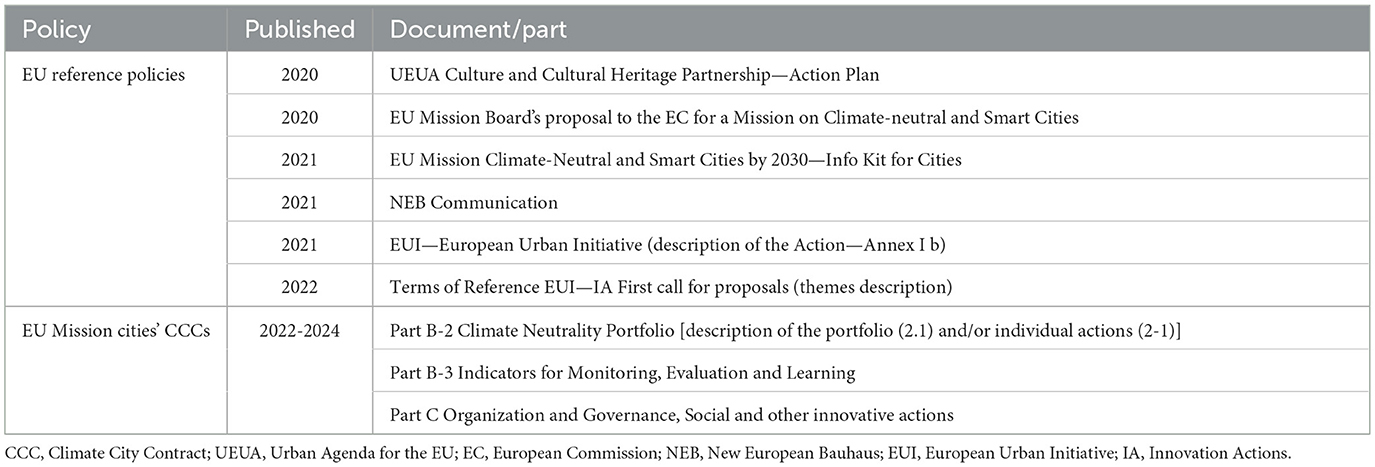
Table 1. European Union Reference Policies and Mission Cities Climate City Contracts sections analyzed.
As for the Mission Climate–neutral and smart cities sample, we have selected those cities that simultaneously have (Table 2):
– An approved CCC
– Culture and creative character (according to JRC City Monitor selection criteria)
– A Sustainable Energy and Climate Action Plan (SECAP), the municipality's commitment under the Covenant of Mayors 2015 (CoM 2030), to reduce greenhouse gas (GHG) emissions by at least 40% by 2030 and perform a climate change vulnerability and risk assessment including cultural heritage safeguard.13
Methodology
To detect the interlinkages between culture-related actions and the CCCs' possible social impacts, we have relied on text mining software, TaLTaC.14 This tool combines natural language processing and statistical techniques (Bolasco and De Gasperis, 2017). We have implemented and progressively refined a thematic categorization (tagging) to facilitate the semantic exploration and document labeling of the selected CCCs. As a first step, we have identified a set of keywords for both the Cultural/heritage domain (Category 1) and the Social domain (Category 2) from the advocacy documents mentioned in the introduction (UNESCO, the OECD, ICOMOS, etc.). We have assumed heritage as both natural (biodiversity, parks, gardens, waterfronts, etc.) and built (streets and paths, squares, and buildings), in the spirit of the NEB.
We have refined this first selection of keywords by analyzing the culture-heritage and social domain vocabulary in the text corpora of the recent EU Green Deal policies and programmes (EU reference policies). We have then searched for the occurrence of these sets of keywords in the 11 CCCs sample. These documents develop a bottom-up approach to climate-neutrality and smartness from specific geographic and socio-cultural contexts, entailing different priorities and, hence, different terminology used. So we have further refined the set of keywords in the two categories. The CCCs' structure follows a standardized template, but not all the cities fully embrace it. For example, the descriptions of individual actions are omitted in some cases. This obliged us to limit the complete analysis to eight of them, excluding Parma, Tampere, and Zaragoza.
Text mining was applied to the CCCs' descriptions of individual actions (Section B2-2). It has also been extended to the portfolios (Section B2-1) for Guimarães and Kalamata and the CCC annex for Leuven. These selected text corpora meaningfully vary from 166 to 4,689 total words, hence leading to different vocabulary sizes and richness.15
The occurrence of Category 1 keywords led us detect the culture- and heritage-related actions in each CCC. To get evidence on how CCC culture- and heritage-related actions may impact the social area, we have attributed the Social domain keywords (Category 2) to four subcategories:
– L&C—Learning and capacity (education and awareness raising)
– SI&Dem—Social innovation and democracy (citizen engagement, accessibility, affordability and inclusion, cohesion, equality, behavioral change, etc.)
– QoL—Quality of life (health, sociality, identity and memory, perception- and reputation-driven by visual, acoustic, and tactile qualities)
– Ec-D—Economic development (creativity for innovation, research, local cultural production, sustainable tourism, and attractiveness for Small - Medium Enterprises (SMEs) and public–private partnerships)
This classification builds on the NetZeroCities indicators framework (Neumann et al., 2022; Rizzo et al., 2022) and the more culture- and heritage-specific “holistic heritage impact assessment model” established by the EU H2020 Social Platform for Holistic Heritage Impact Assessment (SoPHIA)16 project (Arif et al., 2021), both shown in Table 3.
This has allowed us to highlight the interlinkages between the two domains in the CCC actions. We have also applied text mining to detect indicators of culture-induced social impacts (in the four subcategories).
To correct the categorization, that is, the set of keywords used to tag the actions and detect impact indicators, the accuracy of the text mining outputs has been verified at different stages of the process, shown in Figure 1.
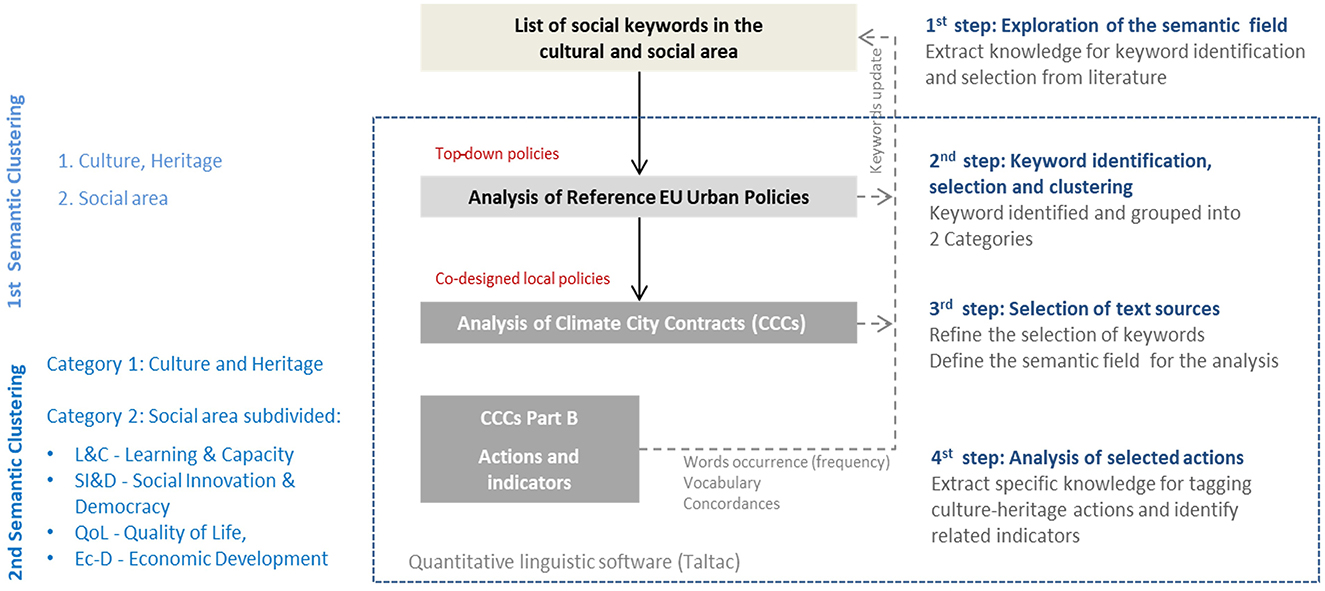
Figure 1. Methodology. L&C, Learning and capacity; SI&D, Social innovation and democracy; QoL, Quality of life; Ec-D, Economic development.
Results
Culture and heritage in reference EU urban policies
The occurrence of the Category 1 keywords in the reference EU policies (shown in Table 4) reveals how heritage and culture are encompassed in the reference programmatic documents, such as the Urban Agenda for the EU Energy Transition Partnership Action Plan and the EUI. The latter belongs to the Cohesion Policy objective 5, “a Europe closer to citizens,” for an integrated and inclusive social, economic, and environmental development, including culture, natural heritage, sustainable tourism, and security in urban areas.
The EU Mission Climate Neutral and Smart Cities Info Kit is rich with culture-related keywords even within its broader scope (climate neutrality and smartness) and its launch before the NEB communication.
The new NEB paradigm, linking aesthetics, sustainability and inclusion, is evident in the vocabulary of the 2022 EUI call for urban innovative actions to demonstrate NEB principles. Skills, affordability, equality, inclusion, accessibility, and sustainable behaviors, in the themes' descriptions of the call, are strictly related to culture and heritage keywords, as shown in Figure 2.
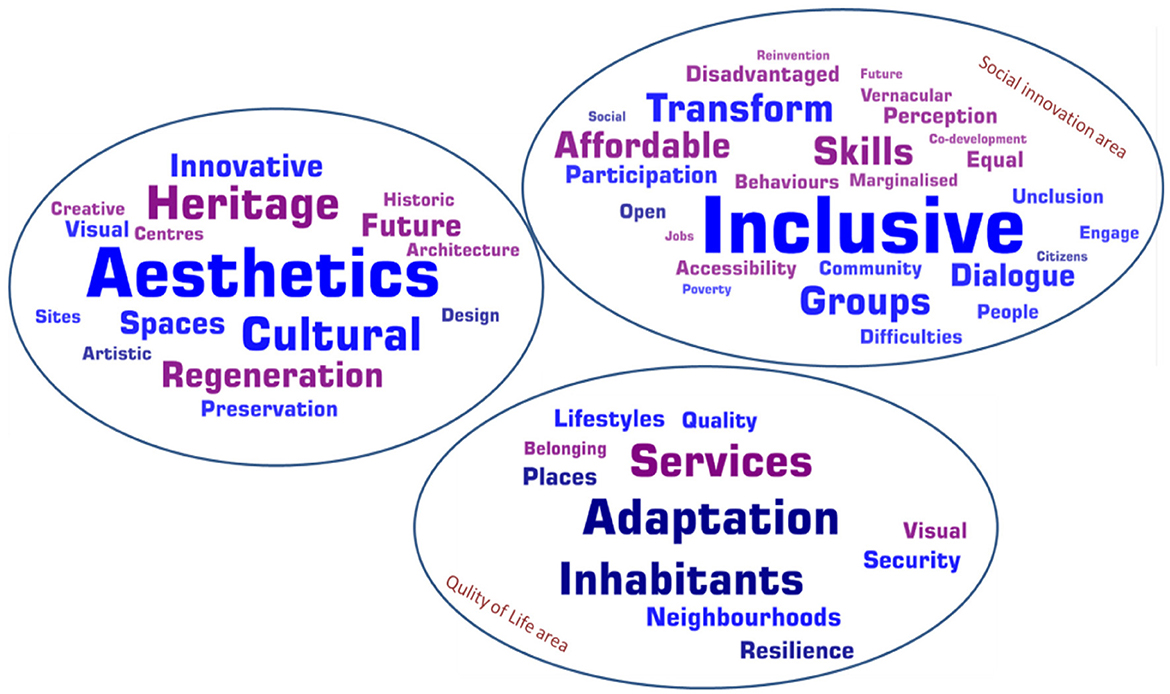
Figure 2. New European Bauhaus demonstrators theme keywords in the European Urban Initiative call (short text made of 283 types).
Culture and heritage and related social aspects in EU mission cities CCCs
So, how are recent innovative urban transition policies responding to the NEB approach?
In the eight Mission Cities' CCCs selected, we have identified 40 Culture and Heritage–related actions. These actions reflect the themes EUI suggested for the NEB demonstrators (regeneration of urban spaces, preservation and transformation of heritage, etc.). They aim at educating citizens, creating awareness, generating social innovation, promoting behavior change and new lifestyles, and supporting economic development and innovation through creativity.
The culture-heritage related actions, that we have tagged by social impact areas (L&C, SI&D, QoL, Ec-D), are evidenced in Table 5. Actions are also classified by transition field (building, mobility, green infrastructure and natural-based solutions, industry, or systemic) and theme.
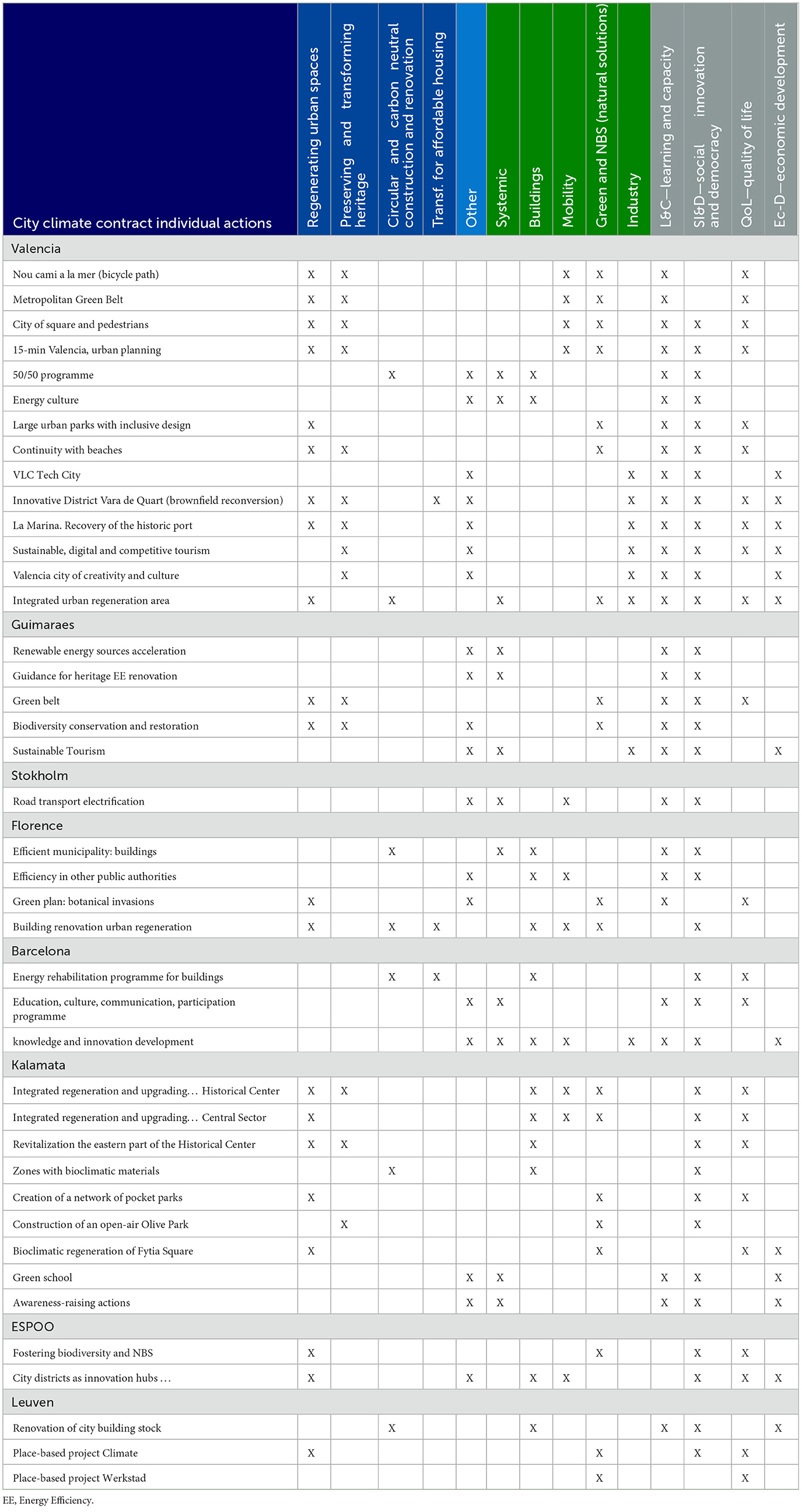
Table 5. Climate City Contracts' Culture-Heritage–related actions by social impact area, transition field, and theme.
The analysis evidenced that culture- and heritage-related actions for learning and capability on climate are a majority. Most cities declare education and awareness efforts as cross-cutting actions, in the general description of the CCC pathway for climate-neutrality and smartness; that's why, learning and capacity (L&C) keywords are absent from the individual actions' descriptions (we derived the information from the human reading of the initial part of the documents). The education effort, with a role for CCIs to engage citizens explicitly specified, may concern low emission and circular regeneration of historic buildings (Guimarães, Florence, Kalamata, and Valencia), climate-neutral mobility (Espoo), sustainable tourism (Guimarães and Valencia), and conservation of biodiversity and protection of natural heritage; the latter improves adaptation and mitigates the urban heat island effect. In 38% of cases, these actions also produce co-benefits in terms of social innovation (i.e., co-creation and the creation of skills for disadvantaged groups).
Barcelona: The Education, Culture, Communication and Participation Programme is a cross-cutting programme. At the educational level, it will strengthen support to schools for climate awareness. Cultural actions will specifically focus on holding debates, exhibitions, and events on the climate emergency. It includes a cultural agenda in the city (performing arts, cinema, concerts, festivals, workshops, itineraries, etc.) that will support the audience to inspire more people and actors. The programme will finance “Artists for Climate” to create projects in various facets of art (fashion, photography, theater, music, film, urban art, etc.) and a “climate action month” in the city's cultural facilities. The programme informs on opportunities, support, and good practices on climate mitigation, ensuring the involvement of specific groups (neighborhood communities and women), especially those most vulnerable (older adults and people with disabilities) and disadvantaged neighborhoods.
The regeneration of heritage spaces and the protection and valorization of valuable sites entail citizen participation and co-creation, hence social innovation17 and democracy in most of these actions (35% of all cases). Heritage can nurture a sense of belonging to places and raise concern on vulnerability to climate hazards. The transformation of heritage sites can “enable the collective reinvention of present and future lifestyles”.18
Guimarães: Guidance for heritage energy efficiency renovation action, mentioning the NEB, is aimed at preserving the historic and local identity of the urban area recognized as a World Heritage Site by UNESCO. It involves citizens in the process of identifying measures to include in the guide. These measures, in fact would simultaneously comply to cultural values (aesthetics, identity, and memory) beyond circularity, energy efficiency, biodiversity, and technological requirements. Within the RES (renewable energy source) acceleration framework, citizens are engaged around the renewable energy community concept for the upgrade (and digitalization) of historical and heritage buildings.
Valencia: 15-Minute city Urban Planning Quality Guidelines, co-designed with citizens, are a framework for improving people's quality of life guaranteeing access to services in a logic of 15-min walk: The aesthetic NEB component is guaranteed by the creation of landscapes, the protection of the seafront and architectural typologies, and affordability by percentages of social housing creation and limiting tourist flats.
An urban heritage regeneration co-benefit is improved quality of life (QoL), linked not only to positive perceptions (visual, acoustics) and health (Stockholm) but also to security and resilience (Valencia, Guimarães, and Leuven). Healthier and more sustainable habits are driven by new green corridors and infrastructures in heritage areas and the valorization of historic centers (Kalamata, Leuven, and Stockholm), waterfronts (Kalamata and Valencia), gardens, and biodiversity sites (Florence, Guimarães, and Espoo).
Kalamata: Integrated interventions for urban regeneration and upgrading of areas of the historical center unifies the various interventions in this zone to guarantee a whole area of recreation, greenery, and a “promenade,” with the intent of changing residents' and visitors' attitudes.
Some CCCs count on heritage and culture's power to attract other activities (recreation, sport, and leisure as well as the tertiary sector and tourism) and leverage economic development (Ec-D). This also includes immaterial heritage valorization, for example, the olive tree culture and the Mediterranean diet and lifestyle (Kalamata, Florence, and Valencia). Innovation hubs count on co-creation with citizens (Espoo), creative start-ups, and, in some cases, heritage site protection and transformation to attract companies and investments (that may be risk-free for the community).
Valencia: City of Creativity and Culture relies on the legacy of the World Design Capital and local creative industry (comics, illustration, audio-visual, the performing arts, music, literature, visual arts, and various local festivals) as a transformational means capable of improving the quality of life and boosting the economy by creating employment, wealth, wellbeing, and social cohesion. Cultural events are asked to incorporate sustainability. The programme looks at citizens' cultural engagement as a way of understanding and thinking about the city and its neighborhoods. Creating new cultural centers also entails renovating existing cultural spaces (municipal libraries) and rehabilitating heritage buildings.
Valencia: the VLC Tech City demonstrator is an open lab on new economy technologies (5G, AI, cybersecurity, and biotechnologies). Design, e-games, and other creativity products are objects of the promoted business initiatives. The reconversion of the District Vara into a 15-min district city embraces implementing new companies and training centers, including culture and creative industries and a citizen laboratory to promote innovation.
Behavioral change (attitudes, lifestyles, and habits) is at the core of half of the actions. As for the transition fields, the actions touching on heritage buildings mostly deal with energy efficiency and circular renovation. Heritage can also be associated with a wider urban transformation, including valorization of natural heritage, natural-based solutions (NBSs), and green mobility.
Mission Cities declare creativity and cultural industries at the heart of their transition plans. Some of them mention their designation as UNESCO Creative City (Florence, Guimarães, and Valencia) or EU capital (Espoo) as a strengthening opportunity. Apart from Valencia, Guimarães, and Espoo [in the Creating Actionable Future (CrAFt) project],19 the CCCs do not explicitly cite the NEB.
Indicators, digitalization, and governance in culture- and heritage-related actions
Barcelona CCC is the only one, in the analyzed sample, to indicate “culture” as a lever for climate neutrality and smartness, having a dedicated strategy for integrating sustainability/climate policies and cultural and educational ones.20 It is to be noted that 2018–2030 Barcelona Climate Plan (Barcelona Climate Plan, 2018) acknowledges the role of culture for the city transition.21 Barcelona adopts specific indicators: “Arts events by climate” (number, number of artists, and number of people who have participated), “City cultural events and festivals that have incorporated sustainability and climate criteria” (number and people attending), and “Cultural facilities participating in the sustainability culture offer” (number and types). Some CCCs (Valencia, Florence, and Leuven), present non-specific indicators: “start-up attractiveness” (if applied to CCIs) that may measure the economic development impact and “fragile population safe from heat islands effects or drought,” “perceived quality of,” and “accessible green spaces” that may quantify the effect of natural heritage protection on quality of life. Other CCCs only adopt mandatory indicators measuring direct impacts on energy and GHG emissions. Culture-related actions, linked to behaviors, do not contribute to the mandatory CCC assessment. Co-benefits indicators of these actions are mostly disused.
Digitalization is rarely addressed in culture- and heritage-related actions; from the very short action descriptions, interpreting how citizens' feedback and digital analytics are managed is difficult. Digitalization is generally related to communication or local economic development actions, in the form of
– consultation platforms, collecting the opinions of citizens on urban planning strategies and individual actions; their feedback is deemed necessary for the aesthetic/functional upgrading, behavioral change, and techniques impacting GHG emissions.
– sustainability observatories on tourism, that incorporate marketing tools, evaluate impacts (water, plastic, energy) and interpret human and climate-related risks of heritage.
– one-stop shops used for communication campaigns (e.g., on renewable energy source integration).
As for Governance, CCIs (libraries, museums, civic centers, youth centers, and youth spaces) are engaged, for example, in Barcelona and Valencia, education programmes. In Valencia, CCIs are part of the Urban Forum, bringing together the entire social, economic, institutional, and cultural fabric of the city. In Kalamata, the Federation of Commercial Handicraft is committed to energy savings and economic development connected to typical local products. In Florence, museum managers are part of the consultation table on energy efficiency measures in historic buildings. Creative start-ups are often engaged for the creation of innovation hubs and districts.
Discussion
Culture contribution to a just transition is quite a recent debate and still lacks a consolidated evidence-base. We have proposed a first method to extract knowledge from and for related policies that are still being developed. Our analysis has shown how “creative” Mission Cities' transition pathways (CCCs) toward climate neutrality and smartness somehow contain the seeds of the NEB approach, with a combination of cultural values (perceptions, aesthetics, and beliefs), sustainability, and societal instances (e.g., inclusion, affordability, and equity).
Culture is mainly intended to stimulate emotion to improve the effectiveness of learning, capacity building, and citizen engagement. Heritage, by nurturing a sense of belonging to places and of vulnerability, is “used” to create consensus on climate actions and behavioral change to consider the “opportunities for new relationships with identity places and enabling the collective reinvention of present and future lifestyles.”
Creative Cities are investing in culture to create human capital, new jobs, and innovation, but the interaction of people's trust and motivation to accelerate the transition toward carbon neutrality is still unclear. The analysis of pertinent text segments could hardly highlight these relationships because, in most CCCs, the actions' descriptions are short and generic or the information is fragmented. Moreover, the analysis highlighted the impossibility of creating evidence from culture and heritage actions because the adoption of proper indicators is neglected. This could be due to the lack of data on micro-social mechanics of sustainability (cultural communities, gender, etc.). As some studies recommend (Montalto et al., 2022), existing metrics are to be upgraded for a more comprehensive measurement of sustainable cities and communities. Criteria for measuring impact of key culture-based programmes, as well as NEB indicators, are still needed.
Digitalization for collecting and crowdsourcing related information and citizen science seems to be underestimated too. Yet it could let information like attitudes, visions, and perceptions be integrated into policy design, implementation, monitoring, and evaluation. In line with the EU Culture experts' recommendations (European Commission, 2022a), cities should better exploit digitalization's full potential (smart citizen platforms, immersive environments, and digital twins) to improve and assess the impact of culture and heritage on their transition. As also the CrAFt project showed, CCIs should be better engaged in the transition governance by strengthening their partnerships in the neighborhood and the city and getting involved throughout all stages for cultural and creative feedback and input (Wyckmans et al., 2024).
Conclusion
We have applied a logical categorization process to text mining to develop a domain-specific human document labeling in the new context of “culture for climate” policies. The first application of our methodology to a dozen CCCs allowed culture-based actions to be tagged and missing assessment indicators identified. It has proved that CCCs are not conceived nor equipped to fully exploit the benefits of culture-related actions, even in “creative” cities. After all, a Culture facet was not originally evidenced in the Mission Cities platform, where a “Culture” label is not attributed to CCCs. The absence of this label does not even allow one to find culture- and heritage-related best practices in the few exemplary CCCs at the moment.22 Our text-mining tagging exercise could be useful in this sense and could enable tagging NEB-inspired CCCs. The model, based on the selection of keywords from a large number of sources, might enhance the semantic exploration and document labeling of a broader number of urban plans and policies. The new upcoming NEB reference framework,23 by facilitating the implementation of NEB values and principles, could lead to the integration and optimization of the defined semantic categories. The application of the methodology to a wider number and typology of documents (new CCCs and culture and climate initiatives and policies, belonging to the so-called gray literature)24 will require capturing as much relevant information as possible (recall/sensitivity analysis) while ensuring a reasonable level of precision/specificity. That was not needed in this first human-assisted exercise for our validation set.
Finally, the described text mining method is meant to evolve into an AI model25 that requires specific knowledge and contextual understanding. Our “culture for climate” domain-specific document labeling (performed by a human expert), in the future, could enable the correct training of an LLM (large language model),26 leading to better results. At present, LLMs are far from being perfect and human-labeled data in the post-LLM era is key. Most advanced AI models like GPT,27,28 in fact, underperform well-trained human annotators in text labeling (Liu, 2023). Developing publicly available and open-source human-labeled data, enriched from the analysis of new assessment frameworks' and projects' results,29 may help in the LLM and knowledge for policy. This is a condition for developing actions and tools for a just urban transition.
Data availability statement
The original contributions presented in the study are included in the article/Supplementary material, further inquiries can be directed to the corresponding author.
Author contributions
EC: Methodology, Conceptualization, Investigation, Writing – review & editing, Supervision, Formal analysis, Writing – original draft. DA: Methodology, Software, Investigation, Writing – review & editing.
Funding
The author(s) declare that no financial support was received for the research and/or publication of this article.
Conflict of interest
The authors declare that the research was conducted in the absence of any commercial or financial relationships that could be construed as a potential conflict of interest.
Generative AI statement
The author(s) declare that no Gen AI was used in the creation of this manuscript.
Publisher's note
All claims expressed in this article are solely those of the authors and do not necessarily represent those of their affiliated organizations, or those of the publisher, the editors and the reviewers. Any product that may be evaluated in this article, or claim that may be made by its manufacturer, is not guaranteed or endorsed by the publisher.
Supplementary material
The Supplementary Material for this article can be found online at: https://www.frontiersin.org/articles/10.3389/fsuep.2025.1613079/full#supplementary-material
Footnotes
1. ^UNESCO - United Nations Educational, Scientific and Cultural Organization, https://www.unesco.org/en.
2. ^UNESCO Glossary, November 2023, https://whc.unesco.org/en/documents/204363.
3. ^Behavioral change: The alteration of human decisions and actions in ways that mitigate/ reduce negative consequences of Climate Change impacts [Joint Reserach Center (JRC), Bertoldi, 2018].
4. ^ICOMOS International Council on Monuments and Sites, https://www.icomos.org/.
5. ^UNFCC COP28 Emirates Declaration. Available online at: https://www.europeanheritagehub.eu/wp-content/uploads/2024/01/EmiratesDeclarationonCultureBasedClimateAction__FINAL.pdf.
6. ^https://www.climateheritage.org/global-call
7. ^This EU Mission aims to help European cities become climate-neutral across all sectors, energy, buildings, waste management, and transport. One hundred twelve cities (100 in EU) have been selected for support from the Commission. The main road maps, the Climate City Contracts, are co-created with local stakeholders and citizens, with the help of a Mission Platform (managed by NetZeroCities).
8. ^CCCs in the NetZeroCities website, last accessed on 4 Nov 2024, https://netzerocities.eu/climate-city-contract/.
9. ^European Commission (EC) Cultural and Creative Cities Monitor, https://composite-indicators.jrc.ec.europa.eu/cultural-creative-cities-monitor.
10. ^Definitions and facets of the just transition are those addressed in EERA (2023).
11. ^As shown by the European Energy Research Alliance Joint Programme “clean Energy tranSition for Sustainable Society” (e3s) (2024).
12. ^“Knowledge for Policy” uses text mining and analysis tools to extract information from online data or large public or proprietary document sets, https://knowledge4policy.ec.europa.eu/text-mining_en.
13. ^The Covenant of Mayors (CoM 2030) provided guidelines for Sustainable Energy and Climate Action Plan (SECAPs) since 2018 with a time perspective to 2030. SECAPs cover mitigation, adaptation and energy poverty and are to be co-developed with the active engagement of a broader group of stakeholders (including citizens). Engagement level, methods, and purposes have to be specified in the strategy. The SECAPs are mandatory for signatories.
14. ^Quantitative linguistic software TaLTaC – Automatic Lexical and Textual Processing for the Analysis of Content, http://www.taltac.com.
15. ^The number of types, which are different words, occurring in Culture/Heritage-related action description, are 1351 in Valencia's CCC, 815 in Barcelona's, 382 in Florence's, 376 in Leuven's, 307 in Guimaraes', 299 in Kalamata's, 251 in Espoo's, and 111 in Stockholm's.
16. ^EU H2020 SoPHIA, Social Platform for Holistic Heritage Impact Assessment, 2020-2021. Available online at: https://sophiaplatform.eu/.
17. ^Better use of common resources and better satisfaction of collective needs, innovation of roles and relationships with a long-term impact, EU def. “SI meet social needs, create social relationships and form new collaborations.”
18. ^EUI 1st Call for Innovation Actions, cit.
19. ^EU HE CrAFt project, Creating Actionable Future project, https://craft-cities.eu/, part of the NEB initiative, supports EU Mission cities and other cities in becoming climate neutral in a sustainable, beautiful, and inclusive way.
20. ^Let's Change for Climate 2030 Plan, https://oidp.net/en/practice.php?id=1328.
21. ^https://www.barcelona.cat/barcelona-pel-clima/sites/default/files/climate_plan_maig.pdf
22. ^https://netzerocities.app/knowledge. Knowledge Repository > Filter resources, Social & Economy > Culture.
23. ^https://new-european-bauhaus.europa.eu/system/files/2025-03/NEB%20Facility%20Roadmap.pdf
24. ^See “Grey literature” in https://www.lib.sfu.ca/help/research-assistance/format-type/grey-literature.
25. ^AI models, like Generative Pre-trained Transformers (GPT), g human-like text and understanding natural language. However, the effectiveness of general-purpose GPT models in specialized domains may be limited due to a lack of domain-specific knowledge and contextual understanding. GPT models are trained using a two-step process that involves pre-training and fine-tuning. During the pre-training phase, the model is trained on vast amounts of text data collected from diverse sources, capturing semantics and acquiring a significant amount of general knowledge. After pre-training, GPT models are adapted to specific tasks or domains by fine-tuning them on smaller, task-specific datasets. This process involves training the model using labeled data from the target domain or task. This fine-tuning allows the model to specialize and improve its performance on domain-specific data while retaining the general language understanding learned during pre-training (Kamnis, 2023).
26. ^LLM is “[a] class of language models that use deep learning algorithms and are trained on extremely large textual datasets that can be multiple terabytes in size. Most LLMs can generate text, although some can only form a compressed representation of an input useful for tasks such as classification or question answering.” From EU (2024).
27. ^GPT = Generative Pre-trained Transformer (GPT) is an artificial intelligence (AI) model designed to generate human-like text. “General purpose AI systems are often large language models, but many such successful systems are used for tasks other than natural language processing… They can process audio, video, textual and physical data. Some of the most influential examples of general purpose AI systems are AlphaStar, Chinchilla, Codex, DALL•E 2, Gopher, GPT-3. These systems are sometimes referred to as “foundation models” and are characterized by their widespread use as pre-trained models for other, more specialized AI systems. For example, a single general purpose AI system for language processing can be used as the foundation for several hundred applied models, some of which can then be further fine-tuned into a number of applications tailored to the customer.” From General purpose AI and the AI Act.
28. ^General Purpose AI and the AI ACT. Available online at: https://digital-strategy.ec.europa.eu/en/faqs/general-purpose-ai-models-ai-act-questions-answers.
29. ^While this article was conceptualized and reviewed, “A practical guide to the New European Bauhaus self-assessment method and tool” was published, Available at: https://publications.jrc.ec.europa.eu/repository/handle/JRC139118, and the first NEB facility call for projects opened (https://new-european-bauhaus.europa.eu/funding/currently-open-and-forthcoming-calls_en).
References
Arif, R., Weigl, A., Wieser, A., Baioni, M., Demartini, P., and Marchiori, M. (2021). “The SoPHIA model and its implementation,” in Economia della Cultura, Rivista trimestrale dell'Associazione per l'Economia della Cultura Speciale/2021, 71–90. doi: 10.1446/103683
Barcelona Climate Plan (2018). Available online at: https://www.barcelona.cat/barcelona-pel-clima/sites/default/files/climate_plan_maig.pdf (Accessed December 16, 2024).
Bertoldi, P. (2018). JRC - Bertoldi P. (editor), Guidebook ‘How to Develop a Sustainable Energy and Climate Action Plan (SECAP) – Part 1 - The SECAP Process, Step-by-Step Towards Low Carbon and Climate Resilient Cities by 2030, EUR 29412 EN. Luxembourg: Publications Office of the European Union.
Bolasco, S., and De Gasperis, G. (2017). “TaLTaC 3.0. A multi-level web platform for textual big data in the social sciences,” in Data Science and Social Research. Studies in Classification, Data Analysis, and Knowledge Organization, eds. N. Lauro, E. Amaturo, M. Grassia, B. Aragona, and M. Marino (Cham: Springer), 97–103. doi: 10.1007/978-3-319-55477-8_9
Costanzo, E. (2024). Cultural Audience Engagement for Climate Action, ECEEE 2024 Summer Study Proceedings: Sustainable, Safe and Secure Through Demand Reduction, 567–573. Available online at: https://www.eceee.org/library/conference_proceedings/eceee_Summer_Studies/2024/5-sustainable-communities/cultural-audience-engagement-for-climate-action/ (Accessed December 16, 2024).
EERA (2023). White Paper: A Just Energy Transition in the EU. Available online at: https://www.eera-set.eu/component/attachments/attachments.html?task=viewandid=1518 (Accessed December 16, 2024).
EU (2021). Info-kit - Mission Climate-Neutral and Smart Cities. Available online at: https://smart-cities-marketplace.ec.europa.eu/news-and-events/news/2021/mission-climate-neutral-and-smart-cities-info-kit-cities-available (Accessed December 16, 2024).
EU (2022a) Council Resolution on the EU Work Plan for Culture 2023-2026 (2022/C 466/01). Available online at: https://eur-lex.europa.eu/legal-content/EN/TXT/PDF/?uri=CELEX:32022G1207(01) (Accessed December 16 2024).
EU (2022b) Terms of Reference EUI Innovation Actions, 1st Call for Proposals 10th Oct 2022. Available online at: https://www.urban-initiative.eu/sites/default/files/2022-10/EN_ToR_EUI-IA-1-Call_10X2022.pdf (Accessed December 16, 2024).
EU (2023). Urban Agenda for the EU, Partnership on Culture/Cultural Heritage Final Action Plan. Available online at: https://www.urbanagenda.urban-initiative.eu/sites/default/files/2023-03/Action%20Plan_Culture%20Cultural%20Heritage.pdf (Accessed December 16, 2024).
EU (2024). EU-U.S. Terminology and Taxonomy for Artificial Intelligence – 2nd Edition. Available online at: https://digital-strategy.ec.europa.eu/en/library/eu-us-terminology-and-taxonomy-artificial-intelligence-second-edition (Accessed December 16, 2024).
EU Commission (2021). New European Bauhaus, September 2021 – COM(2021)573. Available online at: https://new-european-bauhaus.europa.eu/system/files/2021-09/COM(2021)_573_EN_ACT.pdf (Accessed December 16, 2024).
European Commission (2022a). Directorate-General for Education, Youth, Sport and Culture, Stormy Times – Nature and Humans – Cultural Courage for Change – 11 Messages for and From Europe. Publications Office of the European Union. Available online at: https://data.europa.eu/doi/10.2766/90729 (Accessed December 16, 2024).
European Commission (2022b). Directorate-General for Research and Innovation, Fostering Knowledge Valorisation Through the Arts and Cultural Institutions. Publications Office of the European Union. Available online at: https://data.europa.eu/doi/10.2777/377987 (Accessed December 16, 2024).
European Energy Research Alliance Joint Programme “clean Energy tranSition for Sustainable Society” (e3s) (2024). “Survey on: citizens engagement through the Cultural and Creative Industry (CCI) for behavioural change: focus on digitalization,” in 2024 Sustainable Places Conference (25th Sept 2024). Available online at: https://www.sustainableplaces.eu/previous/sp2024/cultural-engagement-through-digitalization/ (Accessed December 16, 2024).
European Urban Initiative (EUI) (2022). European Regional Development Fund, Description of the Action (Annex Ib). Available online at: https://www.urban-initiative.eu/sites/default/files/2022-08/Description%20of%20the%20EUI.pdf (Accessed December 16, 2024).
Gronkiewicz-Waltz, H., Larsson, A., Boni, A. L., Krogh Andersen, K., and Paulo, F. (2020). European Commission: Directorate-General for Research and Innovation, 100 Climate-Neutral Cities by 2030 - by and for the Citizens. Report of the Mission Board for Climate-Neutral and Smart Cities. Publications Office. Available online at: https://data.europa.eu/doi/10.2777/46063 (Accessed December 16, 2024).
Guzman, P., and Daly, C. (2021). Cultural Heritage in Climate Planning; The HiCLIP Pilot Project for Understanding the Integration of Culture into Climate Action. Climate Heritage Network WG4. ICOMOS, Paris. Available online at: https://static1.squarespace.com/static/62fbf293c4912c5514ac3b2a/t/63af53c3d77baf39f985b024/1672434637884/HiCLIP-FINAL-REPORT.pdf (Accessed December 16, 2024).
Gyódi, K., Nawaro, Ł., Paliński, M., and Wilamowski, M. (2023). Informing policy with text mining: technological change and social challenges. Qual. Quant. 57, 933–954. doi: 10.1007/s11135-022-01378-w
Julie's Bicycle and C40 (2017). World Cities Culture Forum. Available online at: https://juliesbicycle.com/wp-content/uploads/2022/01/Culture_and_Climate_Change_Handbook_2017-1.pdf- (Accessed December 16, 2024).
Kamnis, S. (2023). Generative pre-trained transformers (GPT) for surface engineering. Surf. Coat. Technol. 466:129680. doi: 10.1016/j.surfcoat.2023.129680
Liu, Y. (2023). “The importance of human-labelled data in the era of LLMs,” in International Joint Conference on Artificial Intelligence (IJCAI). Available online at: https://www.ijcai.org/proceedings/2023/0802.pdf (Accessed December 16, 2024).
Montalto, V., Sacco, P. L., and Saisana, M. (2022). Cultural, Creative and Sustainable Cities: assessing progress and measurement perspectives. Sustainability 14:4246 doi: 10.3390/su14074246
NetZeroCities (2022). Knowledge Repository > Filter resources, Social and Economy > Culture. Available online at: https://netzerocities.app/knowledge (Accessed December 16, 2024).
Neumann, H. M., Etminan, G., Traunmueller, M., Haindlmaier, G., Chaudhary, N., Jacobi, N., et al. (2022). NetZeroCities Comprehensive Indicator Framework, D2.4.2, Nov. 2022 - (Appendix B: Complete Catalogue of Social Innovation Indicators). Available online at: https://netzerocities.app/_content/files/knowledge/4120/d2_4_2_comprehensive_indicator_framework_v_external.pdf (Accessed December 16, 2024).
OECD (2022). The Culture Fix: Creative People, Places and Industries, Local Economic and Employment Development (LEED). OECD Publishing, Paris. Available online at: https://www.oecd.org/en/publications/the-culture-fix_991bb520-en.html (Accessed December 16, 2024).
Quaglione, D., Cassetta, E., Crociata, A., Marra, A., and Sarra, A. (2019). An assessment of the role of cultural capital on sustainable mobility behaviours: conceptual framework and empirical evidence. Socio-Econ. Plann. Sci. 66, 24–34. doi: 10.1016/j.seps.2018.07.005
Rizzo, F., Mureddu, F., and Bresciani, S. (2022), Report on Indicators Assessment Methods for Social Innovation Action Plans. NetZeroCities D2.7. Available online at: https://netzerocities.eu/wp-content/uploads/2023/11/D2.7-Report-on-Indicators-assessment-methods-for-social-innovation-action-plans.pdf (Accessed December 16, 2024).
Shortall, R., Mengolini, A., and Gangale, F. (2022). Citizen engagement in EU Collective Action Energy projects. Sustainability 14:5949. doi: 10.3390/su14105949
Takaoka, A. J., Ahlers, D., Ådlandsvik, F. W., and Dovland, E. S, Jaccheri, L. (2023). “Towards understanding digital support contributing to climate neutral, inclusive, and beautiful cities: a systematic literature review,” in 2023 IEEE/ACM 7th International Workshop on Green And Sustainable Software (GREENS) (Melbourne, VIC: IEEE), 30–37. doi: 10.1109/GREENS59328.2023.00012
UNESCO (2019). Thematic Indicators for Culture in the 2030 Agenda (UNESCO Culture|2030 Indicators). Paris. Available online at: https://uis.unesco.org/sites/default/files/documents/publication_culture_2020_indicators_en.pdf (Accessed December 16, 2024).
Wyckmans, A., Weir, K., Harjo Hansen, E., and Laschet, M. (2024). Climate-Positive Cities and Communities. A NEB POCKET GUIDE, CrAFt Project Deliverable D2.2, Vesrion2. Available online at: https://craft-cities.eu/wp-content/uploads/2025/01/Neb-Pocket-Guide-Digital-Version.pdf (Accessed December 16, 2024).
Keywords: smart cities (SC), culture, text mining (TM), New European Bauhaus (NEB), climate action, knowledge for policy
Citation: Costanzo E and Alderuccio D (2025) Culture and heritage for a just transition to climate-neutral and smart cities. Text mining supporting New European Bauhaus elements detection. Front. Sustain. Energy Policy 4:1613079. doi: 10.3389/fsuep.2025.1613079
Received: 16 April 2025; Accepted: 15 July 2025;
Published: 04 September 2025.
Edited by:
Alessandro Sciullo, University of Turin, ItalyReviewed by:
Lizbeth Liliana Díaz Muñoz, Autonomous University of Aguascalientes, MexicoAntonio Martella, University of Turin, Italy
Copyright © 2025 Costanzo and Alderuccio. This is an open-access article distributed under the terms of the Creative Commons Attribution License (CC BY). The use, distribution or reproduction in other forums is permitted, provided the original author(s) and the copyright owner(s) are credited and that the original publication in this journal is cited, in accordance with accepted academic practice. No use, distribution or reproduction is permitted which does not comply with these terms.
*Correspondence: Ezilda Costanzo, ZXppbGRhLmNvc3RhbnpvQGVuZWEuaXQ=
 Ezilda Costanzo
Ezilda Costanzo Daniela Alderuccio
Daniela Alderuccio